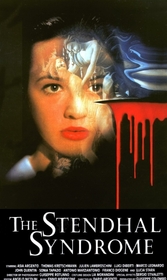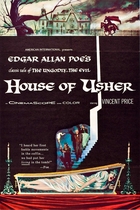Our editor-in-chief Nate Yapp is proud to have contributed to the new book Hidden Horror: A Celebration of 101 Underrated and Overlooked Fright Flicks, edited by Aaron Christensen. Another contributors include Anthony Timpone, B.J. Colangelo, Dave Alexander, Classic-Horror.com's own Robert C. Ring and John W. Bowen. Pick up a copy today from Amazon.com!
The Stendhal Syndrome (1996)
Director Dario Argento latter-day works are not beloved. Most of his classic works were made before 1982 (some would argue all, but I have a soft spot in my heart for Opera). Everything else has been confused, needlessly brutal, or simply redundant. The Stendhal Syndrome, though it holds some promise, is really no different.
I'll give Argento this, though - the first half of the film ranks close to some of his best work. While it lacks the fairy tale dreaminess of Suspiria or the hard-edged giallo thrills of Deep Red, it tries for something different and interesting and mostly succeeds. It begins with a mystery - who is our main character, Anna (played by Dario's daughter Asia)? As soon as that is solved, though, we are introduced to a different, more pressing dilemma. There's a serial rapist on the loose, and he's developed a fascination with Anna. All of this ties into her title affliction, a violent psychological reaction to art.
However, a little over an hour into the film, though, it reaches a form of satisfactory conclusion - and there are still fifty minutes to go. The Stendhal Syndrome completely jumps tracks and starts taking its cues from films like Vertigo and Psycho. Unfortunately, it's not that difficult to figure out, and the second part of the movie just feels blasé.
Argento's eye for violence is still as keen as ever - a bit too keen, actually. The film tackles the subject of rape pretty head-on, exploring it both metaphorically and literally. There are numerous depictions of violent, non-consensual sex, and it is incredibly disturbing (even moreso when you take into account that two of these scenes involve the director's daughter). Not one moment of pain in this film goes wasted - Argento's skill for transferring it to the viewer is put to full use, and where it once was thrillingly uneasy, now it's just repugnant.
Still, there's some gems here. While Asia Argento is by no means a master actress, she does bring us into Anna's world pretty well (although not well enough to make the second half work). Her part is well-scripted, and it's fascinating to see the changes. The film flirts with a lot of masculine misconceptions of rape victims, but tries very hard to maintain the lead's dignity.
The film is available on Troma DVD, and the independent New York company's unabashedly self-promotional style is an odd fit for the revered Argento. The disc is loaded with the usuals - The Troma Intelligence Test II, Julie Strain's godawful Troma Rap, and the ubiquitous Radiation March. The film is introduced by Lloyd Kaufman (founder of Troma and creator of The Toxic Avenger), and he sets entirely the wrong tone for the film. I appreciate the company's effort to distribute such a classic name in horror cinema, but at the same time, it's a typically Troma disc and I'm not sure if that's a good thing.
Also included on the DVD are three interviews (two with Argento and one with special effects guy) that discuss this and other Argento works. Ruggero Deodato also pops up to talk about Cannibal Holocaust (I guess because they're both Italian?). There's a 40 second trailer and biographies for both Argentos.
It's worth a buy for the Argento aficionado (but then again, if you are one of those folks, you probably already have it), but otherwise, don't bother. A few interesting ideas are not worth the major blah (tempered with ick) that surrounds them.








